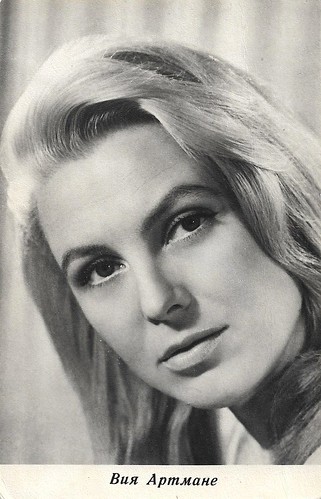
Sovietrussian postcard by Leningrad buro otd. propaganda iskusstvo, no. C. 1972-73.

Latvian postcard by Latvian branch of the All-union bureau of cinematographic propaganda, Riga, 1982. Photo: Lenfilm. Vija Artmane and Evgeniy Matveev in Rodnaya krov/Blood Ties (Mikhail Yershov, 1964). The film deals with a soldier on leave (Matveev) who stops to help a woman (Artmane) run a ferry and bring up her three children while her husband is away at war.
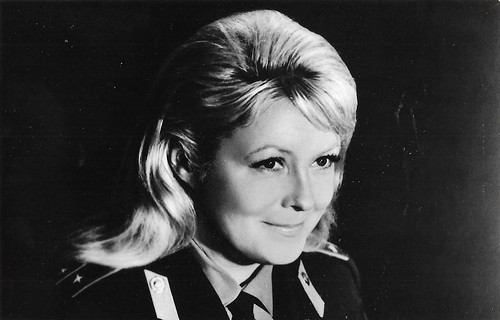
Latvian postcard by Latvian branch of the All-union bureau of cinematographic propaganda, Riga, 1982. Vija Artmane in Davana vientulai sievietei/Gift for the Single Woman (Eriks Lacis 1973).
Juliet of Romeo
Alida Fritsevna Artmane was born in 1929 in the Latvian village of Kaivė near Tukums, at the time when Latvia was a sovereign nation. Her parents, Fritsis Artmane and Anna Zaborska, owned a farm there. Her father died in an accident aged 19, four months before she was born and her Polish mother survived as a single mother by doing seasonal agricultural jobs.
Artmane grew up playing in the fields. While her mother worked for a landlord, her master sent young Artmane to study music and dance at a ballet class for a couple of years. At the age of 10, young Artmane became a shepherd girl. She worked with a herd of cows for five years and survived until the end of the Second World War.
In 1946 she graduated from secondary school and had a dream of becoming a lawyer in order to make the world a better place. At the same time, she was involved in amateur acting at her school and became interested in film and theatre, and eventually, her passion for acting prevailed. She changed her first name to Vija. From 1946 to 1949, she studied at the Second Studio of the Dailes Theatre and became an actress at the Dailes Theatre in 1949. She would be a member of the troupe for the next 50 years. In 1950 she became a member of the Latvian Theatre Union.
When she started to work at the theatre, she quickly attracted the attention of the legendary Latvian theatre director Eduards Smiļģis, founder and main director of the Daile Theater. From 1949 to 1998 Artmane was the leading star of the troupe at the Daile Theatre in Riga. Her first big success came with the role of Juliet in Shakespeare's 'Romeo and Juliet' (1953), where her partner was Eduards Pāvuls. Another success was her role as Eliza Doolittle in George Bernard Shaw's 'Pygmalion'.
Artmane also created important roles in Latvian plays such as 'Indulis and Ārija' and 'Fire and Night' under the direction of the National Actor of Latvia, Rainis. She was critically acclaimed for her stage works in Russian plays, such as her passionate performance as Tolstoy's heroine 'Anna Karenina'; she also played in Tolstoy's 'War and Peace', in Gogol's 'Dead Souls', and other classic Russian plays.
In 1953, Artmane married the Dailes Theatre actor Artūrs Dimiters (1915-1986). They had two children - musician Kaspars Dimiters (1957) and artist Kristiāna Dimitere (1965).
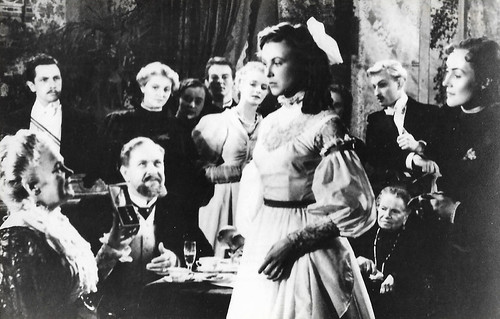
Latvian postcard by Latvian branch of the All-union bureau of cinematographic propaganda, Riga, 1982. Vija Artmane in Za lebedinov staey oblakov/Following the Swan Flock of Clouds (Pavel Armand, 1957).
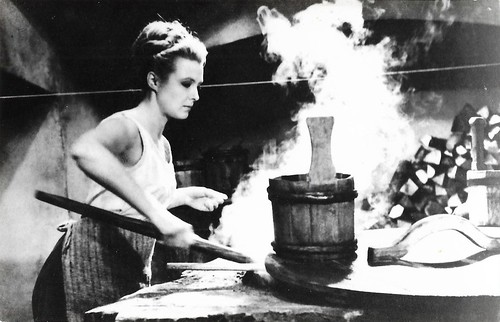
Latvian (former Sovietunion) postcard by Latvian branch of the All-union bureau of cinematographic propaganda, Riga, 1982. Photo: Rigas Kinostudija. Vija Artmane in Purva bridejs/Edgar and Kristina (Leonids Leimanis, 1966). NB the card dates the film as of 1967, IMDb as of 1966. The plot, set in late 19th century Latvia, deals with the coachman Edgar (Uldis Pucitis) who is in love with the maid Kristina (Artmane), though he is unable to overcome her mother's resistance. A charming, wealthy suitor arrives with a proposal but Kristina just can't forget Edgar.

Latvian postcard by Latvian branch of the All-union bureau of cinematographic propaganda, Riga, 1982. Vija Artmane in the Latvian/Russian film Mernieku laiki/The Times of the Surveyors (Voldemars Puce, 1970).
A beautiful and loving mother
Vija Artmane's first screen role came in 1956 in Rolands Kalniņš's film Posle shtorma/After the Storm (1957).
She really came to prominence with the role of Dace in Pāvels Armand's film Kā gulbji balti padebeši iet/Following the Swan Flock of Clouds (1956). It was the real beginning of her film career. In 1958, she became a member of the Union of Latvian Filmmakers.
In 1964 she shot to fame in the Soviet Union with her leading role as Sonya, a beautiful and loving mother, opposite Evgeni Matveev in the popular film Rodnaya krov/Blood Ties. After that film, Artmane was nicknamed "Mother-Latvia" in her homeland.
She enjoyed a steady film career in the Soviet Union during the 1960s, 1970s, and 1980s. Her film career was highlighted with such roles as Veda Kong in the popular Science Fiction film Tumannost' Andromedy/Andromeda Nebula (Evgeniy Sherstobitov, 1967), as Empress Catherine the Great in the historical drama Emelyan Pugachev/Pugachev (Aleksei Saltykov, 1978), and as Julia Lambert in the film Teātris/Theatre (Janis Streics, 1978).
Vija Artmane appeared as herself in a documentary on her life entitled Saruna ar karalieni/Conversation with the Queen (Rolands Kalnins, 1980) which was produced at the Riga Film Studio. From 1998 to 2000 she worked with the New Riga Theatre. There she appeared in the title role in a stage production of 'Queen of Spades' based on the eponymous drama by Alexander Pushkin. Her most recent film is Zolotoy vek/The Golden Age (Ilya Khotinenko, 2003).
All in all, Vija Artmane was one of the most outstanding Latvian theater and film actresses of the 20th century. In total, she played at least 85 roles on stage and 50 on-screen. In 1986, after the death of her husband, she suffered from an emotional breakdown and later had a stroke. In the 1990s, Artmane moved out of the city of Riga and settled in the countryside. In the early 2000s, she converted to Eastern Orthodoxy. In 2004 she published 'Ziemcieši. Mirkļi no manas dzīves', a book of memoirs covering her acting career as well as her personal life. She died in 2008 and is buried in the Pokrov Cemetery in Riga.
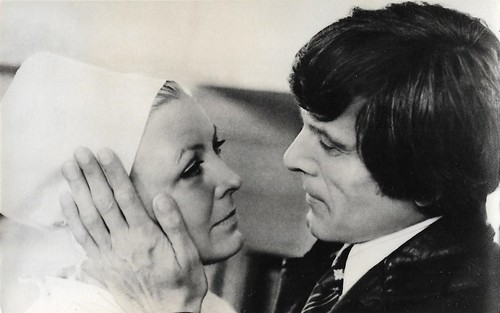
Latvian postcard by Latvian branch of the All-union bureau of cinematographic propaganda, Riga, 1982. Vija Artmane and Igor Ledogorov in Tavs dels/Your Son (Gunars Piesis, 1978). Plot: The mother (Artmane) of an adult son falls in love and now she has to decide whether to arrange her fate or to obey the egoism of her child, who does not want to "share" her mother with anyone.
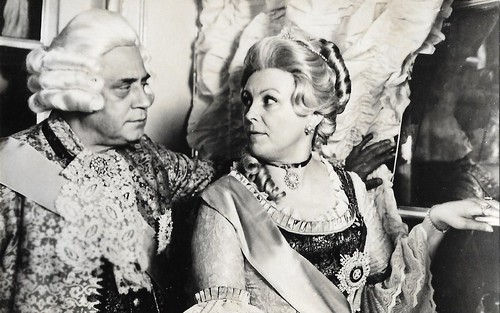
Latvian postcard by Latvian branch of the All-union bureau of cinematographic propaganda, Riga, 1982. Photo: Mosfilm. Vija Artmane as Catherine the Great and Igor Gorbachyov as Nikita Panin, Catherine's mentor, in Emelyan Pugachev/Pugachev (Aleksei Saltykov, 1978-79). Plot: Don Cossack Yemelyan/ Emelyan Pugachev (Evgeniy Matveev) says goodbye to his wife and children and intends to leave, but the elder Filaret begs him to stay and lead a rebellion under the insignia of Peter III of Russia. The rebels led by Pugachev then attack the landowners. Tsarina Catherine II, however, sends troops against the rebels to repress them. Due to a betrayal Pugachev is captured, and later transported across Russia locked in an iron cage.
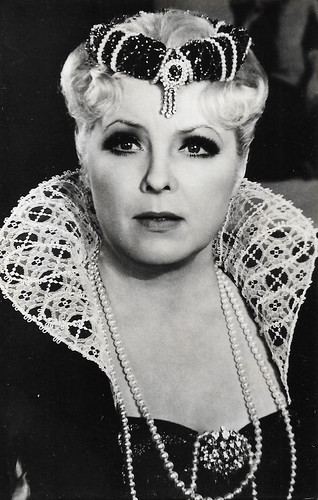
Latvian postcard by Latvian branch of the All-union bureau of cinematographic propaganda, Riga, 1982. Photo: Rigas Kinostudija. Vija Artmane as Julia Lambert in the Somerset Maugham adaptation of 'Theatre': Teatris (Janis Streics, 1978). The plot deals with a popular, slightly elder stage actress, Julia Lambert, whose husband Michel is understanding but also a bit dull. Julia is vain and self-centered, but then she falls in love with Paul, a younger man, who is rather a career hunter and loves an ambitious upcoming actress. The plot, set to play by Guy Bolton, was later filmed and televised several times, with e.g. Danielle Darrieux and Annette Benning as Julia.
Sources: Steve Shelokhonov (IMDb), Wikipedia (English and German), and IMDb
No comments:
Post a Comment